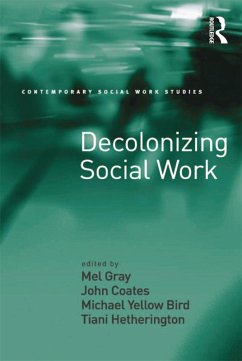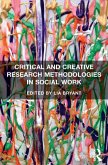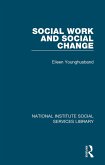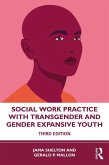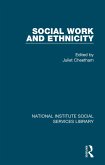Decolonizing Social Work (eBook, PDF)
Redaktion: Gray, Mel; Hetherington, Tiani; Yellow Bird, Michael; Coates, John
54,95 €
54,95 €
inkl. MwSt.
Sofort per Download lieferbar

27 °P sammeln
54,95 €
Als Download kaufen

54,95 €
inkl. MwSt.
Sofort per Download lieferbar

27 °P sammeln
Jetzt verschenken
Alle Infos zum eBook verschenken
54,95 €
inkl. MwSt.
Sofort per Download lieferbar
Alle Infos zum eBook verschenken

27 °P sammeln
Decolonizing Social Work (eBook, PDF)
Redaktion: Gray, Mel; Hetherington, Tiani; Yellow Bird, Michael; Coates, John
- Format: PDF
- Merkliste
- Auf die Merkliste
- Bewerten Bewerten
- Teilen
- Produkt teilen
- Produkterinnerung
- Produkterinnerung

Bitte loggen Sie sich zunächst in Ihr Kundenkonto ein oder registrieren Sie sich bei
bücher.de, um das eBook-Abo tolino select nutzen zu können.
Hier können Sie sich einloggen
Hier können Sie sich einloggen
Sie sind bereits eingeloggt. Klicken Sie auf 2. tolino select Abo, um fortzufahren.

Bitte loggen Sie sich zunächst in Ihr Kundenkonto ein oder registrieren Sie sich bei bücher.de, um das eBook-Abo tolino select nutzen zu können.
In this volume, Indigenous and non-Indigenous social work scholars examine local cultures, beliefs, values, and practices as central to decolonization. Supported by a growing interest in spirituality and ecological awareness in international social work, they interrogate trends, issues, and debates in Indigenous social work theory, practice methods, and education models including a section on Indigenous research approaches.
- Geräte: PC
- mit Kopierschutz
- eBook Hilfe
- Größe: 1.92MB
Andere Kunden interessierten sich auch für
![Critical and Creative Research Methodologies in Social Work (eBook, PDF) Critical and Creative Research Methodologies in Social Work (eBook, PDF)]() Lia BryantCritical and Creative Research Methodologies in Social Work (eBook, PDF)48,95 €
Lia BryantCritical and Creative Research Methodologies in Social Work (eBook, PDF)48,95 €![Reflective Learning for Social Work (eBook, PDF) Reflective Learning for Social Work (eBook, PDF)]() Nick GouldReflective Learning for Social Work (eBook, PDF)52,95 €
Nick GouldReflective Learning for Social Work (eBook, PDF)52,95 €![Social Work in a Glocalised World (eBook, PDF) Social Work in a Glocalised World (eBook, PDF)]() Social Work in a Glocalised World (eBook, PDF)41,95 €
Social Work in a Glocalised World (eBook, PDF)41,95 €![Social Work and Social Change (eBook, PDF) Social Work and Social Change (eBook, PDF)]() Eileen YounghusbandSocial Work and Social Change (eBook, PDF)33,95 €
Eileen YounghusbandSocial Work and Social Change (eBook, PDF)33,95 €![Social Work Practice with Transgender and Gender Expansive Youth (eBook, PDF) Social Work Practice with Transgender and Gender Expansive Youth (eBook, PDF)]() Social Work Practice with Transgender and Gender Expansive Youth (eBook, PDF)33,95 €
Social Work Practice with Transgender and Gender Expansive Youth (eBook, PDF)33,95 €![Social Work and Ethnicity (eBook, PDF) Social Work and Ethnicity (eBook, PDF)]() Social Work and Ethnicity (eBook, PDF)33,95 €
Social Work and Ethnicity (eBook, PDF)33,95 €![Social Change and Social Work (eBook, PDF) Social Change and Social Work (eBook, PDF)]() Timo HarrikariSocial Change and Social Work (eBook, PDF)40,95 €
Timo HarrikariSocial Change and Social Work (eBook, PDF)40,95 €-
-
-
In this volume, Indigenous and non-Indigenous social work scholars examine local cultures, beliefs, values, and practices as central to decolonization. Supported by a growing interest in spirituality and ecological awareness in international social work, they interrogate trends, issues, and debates in Indigenous social work theory, practice methods, and education models including a section on Indigenous research approaches.
Dieser Download kann aus rechtlichen Gründen nur mit Rechnungsadresse in A, B, BG, CY, CZ, D, DK, EW, E, FIN, F, GR, HR, H, IRL, I, LT, L, LR, M, NL, PL, P, R, S, SLO, SK ausgeliefert werden.
Produktdetails
- Produktdetails
- Verlag: Taylor & Francis eBooks
- Seitenzahl: 380
- Erscheinungstermin: 13. Mai 2016
- Englisch
- ISBN-13: 9781317153733
- Artikelnr.: 45096476
- Verlag: Taylor & Francis eBooks
- Seitenzahl: 380
- Erscheinungstermin: 13. Mai 2016
- Englisch
- ISBN-13: 9781317153733
- Artikelnr.: 45096476
- Herstellerkennzeichnung Die Herstellerinformationen sind derzeit nicht verfügbar.
Mel Gray is Professor of Social Work in the Research Institute for Social Inclusion and Wellbeing (RISIW) at The University of Newcastle, Australia. John Coates is Professor of Social Work at St. Thomas University, Fredericton, New Brunswick, Canada. Michael Yellow Bird is Professor of Social Work at Humboldt State University, Arcata, California, USA and is the Founder and previous Director of the Center for Indigenous Peoples' Critical and Intuitive Thinking at the University of Kansas, Lawrence, Kansas, USA. Dr. Tiani Hetherington is Lecturer in Social Work at Griffith University, Australia.
Contents: Preface
Michael Yellow Bird; Part I Theory: Thinking About Indigenous Social Work: Introduction: scoping the terrain of decolonization
Mel Gray
John Coates
Michael Yellow Bird and Tiani Hetherington; Indigenization
indigenous social work
and decolonization: mapping the theoretical terrain
Mel Gray and Tiani Hetherington; Decolonizing social work: an Indian viewpoint
Vidya Rao; Ecospiritual approaches: a path to decolonizing social work
John Coates; Why decolonized social work is more than cross-culturalism
Ann Joselynn Baltra-Ulloa. Part II Practice: From the Bottom Up: Community-based social work in Cuba
Lourdes de Urrutia Barroso and David Strug; Social work practice with Mexican Americans
Flavio Francisco Marsiglia; From trauma to triumph: perspectives for native Hawaiian and Maori peoples
Noreen Mokuau and Peter J. Mataira; Decolonized social work practice in Jordan
Sahar Al-Makhamreh and Mary Pat Sullivan. Part III Education: Facilitating Local Relevance: Decolonizing social work education in Africa: an historical perspective
Linda Kreitzer; Indigenizing the curriculum: the decolonization of social work education in Hawai'i
Paula T. Tanemura Morelli
Peter J. Mataira and C. Malina Kaulukukui; Challenging international social work placements: critical questions
critical knowledge
Samantha Wehbi; Building bridges with indigenous communities through social work education
Nicole G. Ives and Michael Thaweiakenrat Loft. Part IV Research: Decolonizing Methodologies: Kaupapa Maori social work research
Anaru Eketone and Shayne Walker; Indigenizing research for culturally relevant social work practice
Jon K. Matsuoka
Paula T. Tanemura Morelli and Hamilton McCubbin; Neurodecolonization: applying mindfulness research to decolonizing social work
Michael Yellow Bird; Using indigenist research to shape our future
Shawn Wilson; Conclusion: continuing the decolonization agenda
Mel Gray
John Coates
Michael Yellow Bird and Tiani Hetherington
Michael Yellow Bird; Part I Theory: Thinking About Indigenous Social Work: Introduction: scoping the terrain of decolonization
Mel Gray
John Coates
Michael Yellow Bird and Tiani Hetherington; Indigenization
indigenous social work
and decolonization: mapping the theoretical terrain
Mel Gray and Tiani Hetherington; Decolonizing social work: an Indian viewpoint
Vidya Rao; Ecospiritual approaches: a path to decolonizing social work
John Coates; Why decolonized social work is more than cross-culturalism
Ann Joselynn Baltra-Ulloa. Part II Practice: From the Bottom Up: Community-based social work in Cuba
Lourdes de Urrutia Barroso and David Strug; Social work practice with Mexican Americans
Flavio Francisco Marsiglia; From trauma to triumph: perspectives for native Hawaiian and Maori peoples
Noreen Mokuau and Peter J. Mataira; Decolonized social work practice in Jordan
Sahar Al-Makhamreh and Mary Pat Sullivan. Part III Education: Facilitating Local Relevance: Decolonizing social work education in Africa: an historical perspective
Linda Kreitzer; Indigenizing the curriculum: the decolonization of social work education in Hawai'i
Paula T. Tanemura Morelli
Peter J. Mataira and C. Malina Kaulukukui; Challenging international social work placements: critical questions
critical knowledge
Samantha Wehbi; Building bridges with indigenous communities through social work education
Nicole G. Ives and Michael Thaweiakenrat Loft. Part IV Research: Decolonizing Methodologies: Kaupapa Maori social work research
Anaru Eketone and Shayne Walker; Indigenizing research for culturally relevant social work practice
Jon K. Matsuoka
Paula T. Tanemura Morelli and Hamilton McCubbin; Neurodecolonization: applying mindfulness research to decolonizing social work
Michael Yellow Bird; Using indigenist research to shape our future
Shawn Wilson; Conclusion: continuing the decolonization agenda
Mel Gray
John Coates
Michael Yellow Bird and Tiani Hetherington
Contents: Preface
Michael Yellow Bird; Part I Theory: Thinking About Indigenous Social Work: Introduction: scoping the terrain of decolonization
Mel Gray
John Coates
Michael Yellow Bird and Tiani Hetherington; Indigenization
indigenous social work
and decolonization: mapping the theoretical terrain
Mel Gray and Tiani Hetherington; Decolonizing social work: an Indian viewpoint
Vidya Rao; Ecospiritual approaches: a path to decolonizing social work
John Coates; Why decolonized social work is more than cross-culturalism
Ann Joselynn Baltra-Ulloa. Part II Practice: From the Bottom Up: Community-based social work in Cuba
Lourdes de Urrutia Barroso and David Strug; Social work practice with Mexican Americans
Flavio Francisco Marsiglia; From trauma to triumph: perspectives for native Hawaiian and Maori peoples
Noreen Mokuau and Peter J. Mataira; Decolonized social work practice in Jordan
Sahar Al-Makhamreh and Mary Pat Sullivan. Part III Education: Facilitating Local Relevance: Decolonizing social work education in Africa: an historical perspective
Linda Kreitzer; Indigenizing the curriculum: the decolonization of social work education in Hawai'i
Paula T. Tanemura Morelli
Peter J. Mataira and C. Malina Kaulukukui; Challenging international social work placements: critical questions
critical knowledge
Samantha Wehbi; Building bridges with indigenous communities through social work education
Nicole G. Ives and Michael Thaweiakenrat Loft. Part IV Research: Decolonizing Methodologies: Kaupapa Maori social work research
Anaru Eketone and Shayne Walker; Indigenizing research for culturally relevant social work practice
Jon K. Matsuoka
Paula T. Tanemura Morelli and Hamilton McCubbin; Neurodecolonization: applying mindfulness research to decolonizing social work
Michael Yellow Bird; Using indigenist research to shape our future
Shawn Wilson; Conclusion: continuing the decolonization agenda
Mel Gray
John Coates
Michael Yellow Bird and Tiani Hetherington
Michael Yellow Bird; Part I Theory: Thinking About Indigenous Social Work: Introduction: scoping the terrain of decolonization
Mel Gray
John Coates
Michael Yellow Bird and Tiani Hetherington; Indigenization
indigenous social work
and decolonization: mapping the theoretical terrain
Mel Gray and Tiani Hetherington; Decolonizing social work: an Indian viewpoint
Vidya Rao; Ecospiritual approaches: a path to decolonizing social work
John Coates; Why decolonized social work is more than cross-culturalism
Ann Joselynn Baltra-Ulloa. Part II Practice: From the Bottom Up: Community-based social work in Cuba
Lourdes de Urrutia Barroso and David Strug; Social work practice with Mexican Americans
Flavio Francisco Marsiglia; From trauma to triumph: perspectives for native Hawaiian and Maori peoples
Noreen Mokuau and Peter J. Mataira; Decolonized social work practice in Jordan
Sahar Al-Makhamreh and Mary Pat Sullivan. Part III Education: Facilitating Local Relevance: Decolonizing social work education in Africa: an historical perspective
Linda Kreitzer; Indigenizing the curriculum: the decolonization of social work education in Hawai'i
Paula T. Tanemura Morelli
Peter J. Mataira and C. Malina Kaulukukui; Challenging international social work placements: critical questions
critical knowledge
Samantha Wehbi; Building bridges with indigenous communities through social work education
Nicole G. Ives and Michael Thaweiakenrat Loft. Part IV Research: Decolonizing Methodologies: Kaupapa Maori social work research
Anaru Eketone and Shayne Walker; Indigenizing research for culturally relevant social work practice
Jon K. Matsuoka
Paula T. Tanemura Morelli and Hamilton McCubbin; Neurodecolonization: applying mindfulness research to decolonizing social work
Michael Yellow Bird; Using indigenist research to shape our future
Shawn Wilson; Conclusion: continuing the decolonization agenda
Mel Gray
John Coates
Michael Yellow Bird and Tiani Hetherington
